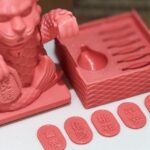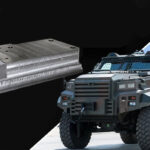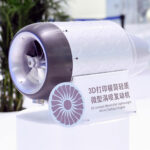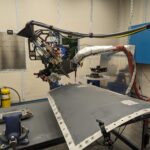3D printing is rapidly advancing, and while it offers incredible opportunities for innovation, it also opens up concerns regarding data security. Companies that rely on 3D printing for manufacturing are dealing with digital files that contain sensitive intellectual property (IP). This makes safeguarding these digital assets a priority, especially in sectors like aerospace, defense, and healthcare.

Cybersecurity Threats in 3D Printing
With the transmission of digital design files, the risk of intellectual property theft and unauthorized access increases. Cybercriminals could intercept files or even alter them, leading to defective parts or sabotage. The impact of this in industries like defense or healthcare could be catastrophic. A single compromised design file could result in critical operational failures.
Moreover, 3D printing platforms connected to the cloud are vulnerable to cyberattacks, making it crucial to implement protective measures. For companies, employing secure systems, such as encryption or using tools like VPN for PC, can ensure safer transmissions of sensitive data between design teams and production sites. These solutions reduce the risk of external interference, ensuring that only authorized individuals can access the files.
Encryption plays a vital role in securing 3D printing workflows. It ensures that only authorized users can access the digital files, preventing unauthorized copying or altering of designs. Virtual Private Networks also offer a layer of security, particularly for remote teams or cloud-based 3D printing platforms.
Strategies for Securing 3D Printing Workflows
Securing 3D printing workflows doesn’t stop at encryption. Companies are adopting a wide range of technologies and practices to ensure data integrity:
- Digital Rights Management (DRM): This can be integrated into 3D printing workflows to control access to design files and ensure that they are used only as intended.
- Blockchain Technology: Blockchain has emerged as a powerful tool to secure and authenticate digital files in additive manufacturing. By offering immutable records of every transaction, blockchain ensures that designs are authentic and have not been tampered with. This technology can guarantee traceability from design to production, offering increased transparency.
- Data Transfer Protocols: Securing data transmission between 3D printing software and machines can also be enhanced using secure protocols such as TLS (Transport Layer Security), which encrypts information while it moves between networks.
Industry Regulations and Compliance
For industries like aerospace, where data security is critical, compliance with regulatory frameworks is crucial. For example, defense-related manufacturers must comply with ITAR (International Traffic in Arms Regulations), which governs the export of defense-related materials, including 3D printing designs. Any data breach could result in significant penalties and pose national security risks.
NIST (National Institute of Standards and Technology) provides guidance and best practices on cybersecurity, including specific frameworks that 3D printing companies can follow to protect their data and ensure compliance with industry regulations.
Future Outlook for Data Security in 3D Printing
The convergence of artificial intelligence (AI) with 3D printing is creating additional challenges and opportunities. As AI-powered 3D printing becomes more prevalent, new vulnerabilities might emerge, such as tampering with AI algorithms responsible for design optimization. Hence, the importance of robust cybersecurity measures becomes even more pressing as the technology evolves.
In conclusion, data security is an indispensable part of the 3D printing ecosystem. By implementing encryption, secure data transfer protocols, and innovative technologies like blockchain, companies can safeguard their intellectual property, reduce the risk of data breaches, and ensure compliance with industry regulations. As 3D printing continues to evolve, the emphasis on securing digital workflows will only intensify.










